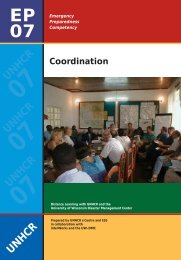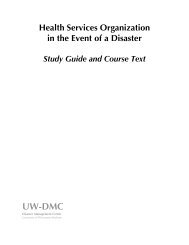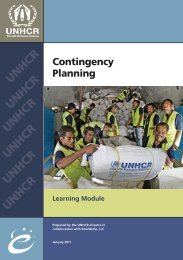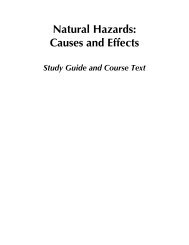Managing External Relations - Disaster Management Center ...
Managing External Relations - Disaster Management Center ...
Managing External Relations - Disaster Management Center ...
You also want an ePaper? Increase the reach of your titles
YUMPU automatically turns print PDFs into web optimized ePapers that Google loves.
EP<br />
04<br />
40<br />
<strong>Managing</strong> <strong>External</strong> <strong>Relations</strong><br />
The UN System<br />
As the lead agency for refugee issues, UNHCR is ultimately responsible for co-ordination of refugee<br />
operations within the UN system. It is crucial that UNHCR seeks support and assistance from other<br />
UN organisations and other involved groups at the onset of an emergency. Close collaboration with<br />
professionals from these organisations and maintenance of positive contacts can prove invaluable in<br />
the event of a joint emergency response.<br />
There are several UN organisations or bodies that may have an influence on UNHCR operations.<br />
Collaborating agencies with special emergency responsibilities include WFP, UNICEF, UNHCHR, WHO,<br />
UNDP and OCHA. Descriptions of these organisations are in Annex 2. Key UN bodies are:<br />
The General Assembly (GA) is the main deliberative body of the United Nations system.<br />
It is composed of representatives of all Member States, each of which has one vote.<br />
Decisions on important questions require a two-thirds majority. Although most of its<br />
decisions are non-binding recommendations, the Assembly adopts instruments such<br />
as conventions that are legally binding on the signatories. The GA adopts resolutions<br />
on a wide range of matters of international concern. These include refugee issues and<br />
situations, specific complex emergency situations and humanitarian assistance efforts<br />
as well as resolutions on matters regarding UN humanitarian assistance, such as UN<br />
co-ordination mechanisms.<br />
As a subsidiary body of the GA, UNHCR follows policy directives (resolutions) of<br />
the GA. The High Commissioner’s annual report (which provides an overview of the<br />
High Commissioner’s main concerns and activities in the fields of protection, assistance,<br />
relations with other organisations, funding and public information) is presented to the<br />
Third Committee of the GA.<br />
The Security Council (SC) has primary responsibility under the UN Charter for the<br />
maintenance of international peace and security. When a dispute leads to a conflict<br />
between parties, the SC may adopt resolutions on a variety of measures. These<br />
may include demand for cease-fire, dispatch of observers to monitor the cease-fire,<br />
recommendation of other appropriate actions for a peaceful settlement, or sending<br />
UN peacekeeping forces to help reduce tensions while negotiations are taking place.<br />
Failure to comply with the resolutions or decisions of the SC may result in enforcement<br />
measures under the UN Charter such as economic sanctions or even collective military<br />
action. While a UN peacekeeping operation can only be dispatched following adoption of<br />
a SC resolution, this is not the case for UN humanitarian assistance. This assistance can be<br />
initiated by the UN agencies themselves, based on their mandates. Because UNHCR often<br />
operates as a result of, or in a situation of conflict, it is important to understand the<br />
functions of the SC and be informed of its activities.<br />
The Economic and Social Council (ECOSOC), composed of 54 member countries<br />
elected for three-year terms, functions under the authority of the General Assembly.<br />
As one of the agencies dealing with social and economic issues, UNHCR reports to the<br />
GA through ECOSOC. Agencies with similar mandatory arrangements include WFP,<br />
UNICEF, UNCTAD, UNDP, and UNEP. ECOSOC serves as a central forum for discussion<br />
and formulation of policy recommendations on issues in the economic and social<br />
spheres. The daily work of ECOSOC is carried out by subsidiary bodies or commissions<br />
or committees that meet at regular intervals.<br />
In recognition of the special experience and technical knowledge of NGOs, over 1,500<br />
NGOs have consultative status with ECOSOC. These NGOs may be represented in the<br />
public meetings of the Council and may make statements relevant to the Council’s work.








